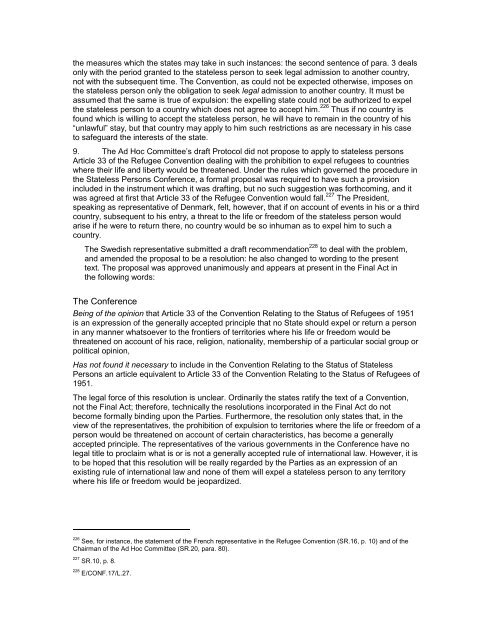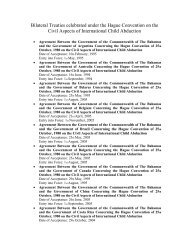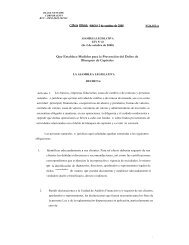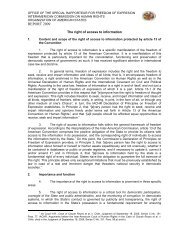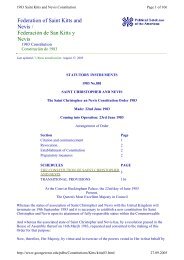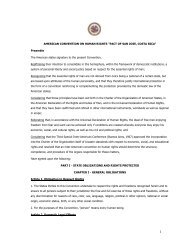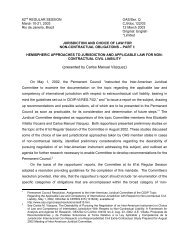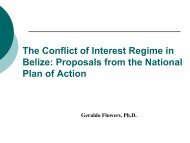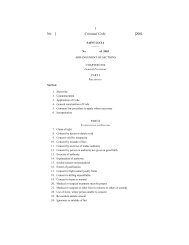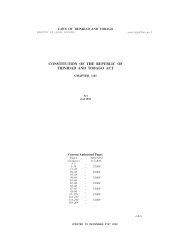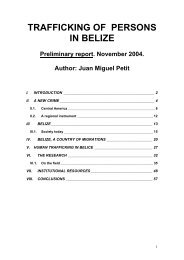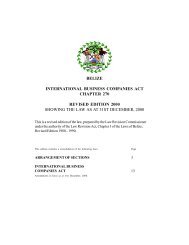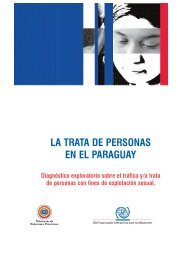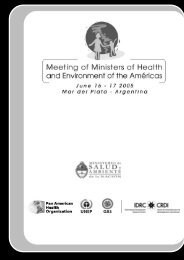CONVENTION RELATING TO THE STATUS OF ... - Refworld
CONVENTION RELATING TO THE STATUS OF ... - Refworld
CONVENTION RELATING TO THE STATUS OF ... - Refworld
You also want an ePaper? Increase the reach of your titles
YUMPU automatically turns print PDFs into web optimized ePapers that Google loves.
the measures which the states may take in such instances: the second sentence of para. 3 deals<br />
only with the period granted to the stateless person to seek legal admission to another country,<br />
not with the subsequent time. The Convention, as could not be expected otherwise, imposes on<br />
the stateless person only the obligation to seek legal admission to another country. It must be<br />
assumed that the same is true of expulsion: the expelling state could not be authorized to expel<br />
the stateless person to a country which does not agree to accept him. 226 Thus if no country is<br />
found which is willing to accept the stateless person, he will have to remain in the country of his<br />
“unlawful” stay, but that country may apply to him such restrictions as are necessary in his case<br />
to safeguard the interests of the state.<br />
9. The Ad Hoc Committee’s draft Protocol did not propose to apply to stateless persons<br />
Article 33 of the Refugee Convention dealing with the prohibition to expel refugees to countries<br />
where their life and liberty would be threatened. Under the rules which governed the procedure in<br />
the Stateless Persons Conference, a formal proposal was required to have such a provision<br />
included in the instrument which it was drafting, but no such suggestion was forthcoming, and it<br />
was agreed at first that Article 33 of the Refugee Convention would fall. 227 The President,<br />
speaking as representative of Denmark, felt, however, that if on account of events in his or a third<br />
country, subsequent to his entry, a threat to the life or freedom of the stateless person would<br />
arise if he were to return there, no country would be so inhuman as to expel him to such a<br />
country.<br />
The Swedish representative submitted a draft recommendation 228 to deal with the problem,<br />
and amended the proposal to be a resolution: he also changed to wording to the present<br />
text. The proposal was approved unanimously and appears at present in the Final Act in<br />
the following words:<br />
The Conference<br />
Being of the opinion that Article 33 of the Convention Relating to the Status of Refugees of 1951<br />
is an expression of the generally accepted principle that no State should expel or return a person<br />
in any manner whatsoever to the frontiers of territories where his life or freedom would be<br />
threatened on account of his race, religion, nationality, membership of a particular social group or<br />
political opinion,<br />
Has not found it necessary to include in the Convention Relating to the Status of Stateless<br />
Persons an article equivalent to Article 33 of the Convention Relating to the Status of Refugees of<br />
1951.<br />
The legal force of this resolution is unclear. Ordinarily the states ratify the text of a Convention,<br />
not the Final Act; therefore, technically the resolutions incorporated in the Final Act do not<br />
become formally binding upon the Parties. Furthermore, the resolution only states that, in the<br />
view of the representatives, the prohibition of expulsion to territories where the life or freedom of a<br />
person would be threatened on account of certain characteristics, has become a generally<br />
accepted principle. The representatives of the various governments in the Conference have no<br />
legal title to proclaim what is or is not a generally accepted rule of international law. However, it is<br />
to be hoped that this resolution will be really regarded by the Parties as an expression of an<br />
existing rule of international law and none of them will expel a stateless person to any territory<br />
where his life or freedom would be jeopardized.<br />
226 See, for instance, the statement of the French representative in the Refugee Convention (SR.16, p. 10) and of the<br />
Chairman of the Ad Hoc Committee (SR.20, para. 80).<br />
227 SR.10, p. 8.<br />
228 E/CONF.17/L.27.


